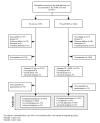Lifestyle as a predictor for colonic neoplasia in asymptomatic individuals
- PMID: 16412216
- PMCID: PMC1374667
- DOI: 10.1186/1471-230X-6-5
Lifestyle as a predictor for colonic neoplasia in asymptomatic individuals
Abstract
Background: Lifestyle is a well-established risk factor for colorectal cancer (CRC) and is also found to be associated with occurrence of adenomas. In the present study we evaluated risk factors for both low-risk adenomas and advanced neoplasia in asymptomatic individuals using a single-paged questionnaire. Aiming to see if the questionnaire was a useful tool in picking up high-risk individuals.
Methods: A cross-sectional study was carried out within a randomised controlled colorectal cancer screening trial (n = 6961). The population comprised men and women born between 1946 and 1950. Before screening in year 2001 they were asked to fill in a questionnaire about their present lifestyle. Cases were categorised according to the most severe findings at screening. Analyses were then conducted to find risk factors associated with the presence of either low-risk adenomas or advanced neoplasia.
Results: The response rate among attendees was 97% (3998/4111). Among these, 3447 (86%) had no neoplasia, 443 (11%) had low-risk adenomas, and 108 (3%) had advanced neoplasia. Low-risk adenomas were significantly associated with current smoking, and obesity. Participants with advanced neoplasia had a two-fold increased risk of not adhering to any of the selected lifestyle recommendations compared to controls. However, current smoking was the only variable that reached statistical significance in the multivariate analysis for these lesions. A dose-response relationship to the consumption of cigarettes per day was shown, where OR was 2.04 (CI 1.07-3.89) for the lowest consumption category.
Conclusion: The present findings indicate that a short questionnaire may be adequate in picking up the most consistent associations between lifestyle risk factors and colorectal neoplasia. Smoking and BMI were found to be the most significant risk factors for neoplasia, but adhering to recommendations on diet, and physical activity seems also to be of importance.
Figures


 Servings of fruit, vegetables and berries per day.
Servings of fruit, vegetables and berries per day.  Total score of physical activity.
Total score of physical activity.  BMI.
BMI.
 No neoplasia.
No neoplasia.  Low-risk adenoma.
Low-risk adenoma.  Advanced neoplasia.
Advanced neoplasia.References
-
- Ferlay J, Bray F, Pisani P, Parkin D M. GLOBOCAN 2002: Cancer Incidence, Mortality and Prevalence. Worldwide IARC CancerBase No. 5. Version 2.0. IARCPress, Lyon.; 2005. http://www-dep.iarc.fr/ Accessed : October 25, 2004.
-
- Giovannucci E. Diet, body weight, and colorectal cancer: a summary of the epidemiologic evidence. J Womens Health (Larchmt) 2003;12:173–182. - PubMed
-
- Thune I, Furberg AS. Physical activity and cancer risk: dose-response and cancer, all sites and site-specific. Med Sci Sports Exerc. 2001;33:S530–50discussion. - PubMed
-
- Giovannucci E. An updated review of the epidemiological evidence that cigarette smoking increases risk of colorectal cancer. Cancer Epidemiol Biomarkers Prev. 2001;10:725–731. - PubMed
Publication types
MeSH terms
LinkOut - more resources
Full Text Sources
Medical

